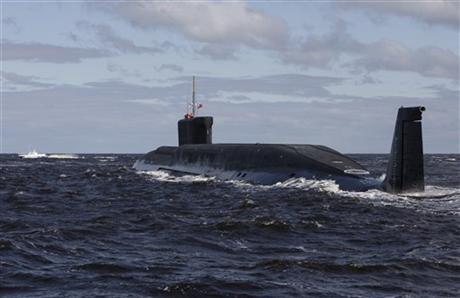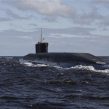
Militarism Is a Poor Fit for Putin’s ‘Patriotic’ Kleptocracy
Publication: Eurasia Daily Monitor Volume: 10 Issue: 6
By:

The need to mobilize the core support base and re-invent a drive for the aging bureaucratic regime is recognized very clearly in the Kremlin, despite the desire to close out the tumultuous election period. Greater volume rather than sophistication in official propaganda is a key part of this effort, which is centered on the “patriotic” theme that seeks to portray the opposition as “foreign agents” working against Russia’s stability and prosperity. President Vladimir Putin knows that his political survival depends on determination in suppressing the “internal enemies” and believes that Western interference in this domestic crisis has to be eliminated (Ezhednevny Zhurnal, January 8). He used to rely on Russia’s powerful role as an energy exporter for securing a position of strength for the country but is now seriously disappointed in Gazprom’s disrepute and weakness in the key European market. However, military might is still perceived as an infallible means of reasserting Russia’s invincibility, and Putin aims at revitalizing his regime by blending “patriotism” with militarism.
This reversion to the Soviet basics was on display last week as the Yuri Dolgoruky, the first Borei-class strategic submarine, was officially accepted into the navy, and its sister sub, the Vladimir Monomah, was launched from the dry dock—its construction to be completed while afloat (RIA Novosti, January 10). Putin came to Severomorsk but opted not to take part in the ceremony perhaps considering Yuri Dolgoruky, which was bedeviled by endless delays since its keel was started in 1996, as a not very lucky ship (Kommersant, January 11). The Borei-class vessel’s main weakness is the submarine-launched Bulava ballistic missile, which had failed eight tests before a successful series in 2010–2011, finally making it possible to approve this weapons system as fit for service (Newsru.com, January 10). Russia’s Arctic neighbors are not entirely reassured, however, reflecting on the Russian space program’s recurrent failures in satellite launches and particularly on the fire in the dry dock where the Yekaterinburg strategic submarine was undergoing minor repairs with a full complement of nuclear missiles and torpedoes on board in late December 2011. Nevertheless, Deputy Prime Minister Dmitry Rogozin wrote about the Yuri Dologoruky submarine on Twitter with characteristic pomp: “Drozhite, burzhui, kirdyk vam!” which can be translated only loosely as “Beware, bourgeois, you are done with!” (Vzglyad, January 10).
There is hardly anything scary about the new generation of Russian strategic submarines except for their propensity to experience technical failure. But there is, indeed, a pronounced desire to demonstrate the Russian Navy’s capabilities to project power—and it is going to be materialized in the large-scale naval exercises in the Eastern Mediterranean (RIA Novosti, January 11). Moscow perceives Western criticism of its inflexible position on Syria as proof positive of the effectiveness of Russia’s counter-intervention course and is rather proud of the global attention that its contrarianism attracts. With the planned exercises off the Syrian coast, however, Moscow’s disagreeable pose is changing into a pro-active engagement that will reportedly include a landing of marine units that would train in evacuating people and equipment (Gazeta.ru, January 11). It is impossible to foresee the impact of such provocative exercises as hitting Syrian beaches amidst a raging civil war, but apparently for the supreme commander the risks are acceptable when measured against the expected benefits of showing a combat-ready military muscle (Ezhednevny Zhurnal, January 12).
It is entirely possible that Putin has an inflated perception of the strength of this muscle because the top brass have good reasons not to reveal the scope of problems generated by the poorly planned but stubbornly advanced military reform. The newly-appointed Defense Minister Sergei Shoigu is struggling to correct some of the most glaring mistakes without bringing the reform process to a standstill at the stage where the military’s capabilities are at their lowest point (Nezavisimaya Gazeta, December 26, 2012). He avoids engaging in fights with the defense industries that seek to take control over the rearmament program, knowing that such confrontation was the undoing of his predecessor, Anatoly Serdyukov. Shoigu’s problem is not only that he does not have enough loyalists to put in the key positions but mostly that the whole notion of reform has become associated with shameless corruption. Serdyukov, meanwhile, brazenly refuses to cooperate with the investigation against him, assuming that Putin has not and perhaps cannot take the decision to make him into a scapegoat in the populist anti-corruption campaign (Kommersant, January 12). In the heat of these intrigues, there is little time to pay attention to the “unpatriotic” fact that soldiers are dying from pneumonia in the garrisons in the Moscow region (Newsru.com, January 12).
Such simple truth about the real status of the Army is, however, far more important for the domestic audience than the bombastic bragging about submarine launches and exercises in far-away seas. The attempts to exploit militaristic rhetoric resonate weakly with the old Soviet “missile pride” but confirm the perception—spreading among the discontented urban classes—of a delusional and deceitful leadership. The committed anti-Putin opposition rallying around the Coordination Council may constitute a small minority in Russia, but it persistently reaches out to connect with every new source of discontent, staying on message of the illegitimacy of fraudulent elections and highlighting every blunder that the disorganized bureaucratic machine produces. The law banning the adoption of orphans by US citizens could not fail to insult millions of Russians who believe that children should not be used in political games, and the protest march in Moscow last Sunday attracted thousands of new participants who had never thought about expressing their disappointment with Putin’s “stability” in the streets (Gazeta.ru, January 11).
This shrinking of a politically indifferent majority deepens worries in Putin’s nomenklatura and tightens his resolve to “show strength.” But the president’s drift toward harsh authoritarianism is now close to the limits set by the corruption of the bureaucracy and the earnest desire of his loyal lieutenants to remain legitimate investors in the West. Much the same way, he cannot make the war machine into Russia’s core structure because his key elites have no interest in that and use militarism only as camouflage for their control over money-making assets. They can stage dirty provocations against the opposition—as Stalin persecuted the “murderous plot of doctors” exactly 60 years ago—but their fake patriotism and quasi-militarism only propel Putinism toward a messy end.




